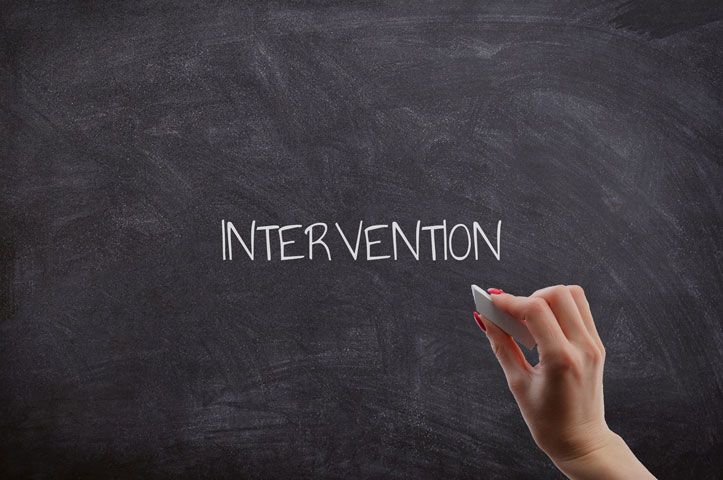When someone is struggling with addiction, it is only a matter of time until his or her tendencies become obvious to others. At the beginning of one’s addiction, he or she may only display a few red flags of symptoms such as being secretive or asking to borrow some cash. By the time that his or her addiction has developed, he or she may then start showing symptoms like mood swings, changes in physical appearance, and even violent behaviors. The farther along an individual gets into his addiction, the more difficult it becomes to get him or her the treatment that is needed.
As the loved one of an addict, you have likely already racked your brain for ideas on how to help him or her, and chances are you have taken action at least once, if not multiple times. Continuing the cycle of worrying, taking action, and being disappointed in the results is extremely overwhelming and demoralizing for anyone to experience. And while there are a handful of different ways that you can guide a loved one towards getting treatment, sometimes these efforts simply do not work.
Thankfully, there are some external options for helping someone who is addicted to drugs and/or alcohol, one of them being an intervention.
What is an Intervention?
An intervention is a process where friends, family, and loved ones confront an individual struggling with substance use disorder in a non-threatening manner. Through the help and guidance of an intervention specialist, therapist, or counselor, all those worried about the addict can get him or her in one place and state their concerns, declare their love for the individual, and provide him or her with the option to go get help at a professional treatment center.
If the individual stays for the intervention (many often leave prior to even starting) and turns down the option for getting treatment, his or her loved ones can share their newfound boundaries and ultimatums related to that decision. For example, if a mother has a son who is addicted to a drug but refuses treatment, she can provide an ultimatum that includes not allowing him to stay in her house anymore, or no longer giving him money.
Studies have shown that interventions serve as one of the most effective tools in getting an addict to finally decide to get treatment.
When Should I Have an Intervention for a Loved One?
Addiction is an extremely complex disease that often leaves loved ones of an addict feeling depleted, hopeless, and resentful. And while it can be scary to consider an intervention for him or her, it might possibly be one of the greatest things you can do.
The question is: when should you have the intervention? Everyone’s threshold for chaos is different, meaning that one person might think an intervention is needed after an individual abuses heroin for one month, while the other might think an intervention is needed after a loved one is revived with Narcan. Either way, knowing the basics of what quantifies needing an intervention is very important not only to you, but you’re loved one, as well.
Changes in behaviors
Any time a mind-altering substance is being abused, an individual will experience some level of behavioral changes. However, the longer that an individual abuses drugs and/or alcohol for, the more likely he or she is to suffer from consistent changes in behavior. Depending on the type of substance that your loved one is abusing, he or she might be aggressive, violent, depressed, anxious, or even suicidal. When any behaviors like these occur, having an intervention not only helps your loved one get him or herself under control but also protects the wellbeing of those around him or her.
Changes in physical appearance
When your loved one is addicted to one or more substances and he or she begins experiencing changes to his or her physical appearance, considering an intervention can be critical for his or her wellbeing. Abusing addictive substances can cause a number of different physical changes, such as significant weight loss/gain, unkempt appearance, and burns, scratches, or bruising. While considering one’s appearance might seem superficial, doing so in this situation can be life-saving. If an individual is experiencing several outward physical effects, chances are that he or she is experiencing internal physical effects of addiction, too. And, the sooner that treatment is obtained, the healthier he or she will be. An intervention can be an effective way of guiding an individual towards help.
Indications of tolerance
Your loved one might be physically dependent on the substance that he or she is using, and it can be simple to notice if you know what to look for. When an individual is tolerant to a substance, he or she cannot go without it for too long without experiencing withdrawal symptoms such as powerful cravings, headaches, or muscle cramps. The dangerous thing about tolerance is that your loved one will have to continually increase his or her dose in order to achieve the effects he or she wants. As a result, he or she is at extreme risk for suffering an overdose, as the body can only handle so much. Staging an intervention can prevent your loved one from getting to a point of no return.
Other common issues that can be considered when thinking of holding an intervention for your loved one include how he or she is performing at work, does he or she have health problems, is he or she being deceitful in an attempt to keep using, or is he or she putting anyone else is significant danger due to the addiction.
Get Help
If you are considering having an intervention for your loved one, chances are that your gut instinct is telling you to do so. And as the loved one of an addict, you know him or her best. However, when any of the above-listed symptoms are occurring, taking matters into your own hands and rallying friends and family together to help your loved one can be extremely effective.
The most effective way in which you can do this is by reaching out to a therapist or intervention specialist who can help kick-start the process. From there, he or she can help guide you and your loved ones through the process and explain the actual intervention to you in more detail.
If your loved one’s well-being is at risk, do not push it aside. Contact us right now and we can help get your connected with the right resources. Call us today.







